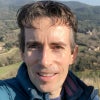He’s got a dapper new rainbow jersey in his kit drawer, but it’s not uncharitable to say that Mads Pedersen‘s world championships win was a huge surprise on Sunday. The 23-year-old had just one victory to his credit this season and was far down the list of race favorites, yet the Danish rider was the one who crossed the line arms aloft.
Pedersen was a big surprise, eclipsing more fancied riders like three-time champion Peter Sagan (Slovakia), Olympic champion Greg van Avermaet (Belgium), Tour de France animator Julian Alaphilippe (France), and defending champ Alejandro Valverde (Spain).
And yet it’s far from the first time that an outsider has won cycling’s most prestigious one day race. Taking the past three decades as a sample, there is a scattering of championship winners who defied expectations and dismayed the bookies. Some flourished after their wins, some faltered. These are those riders.
1990: Rudy Dhaenens
Riding the Utsunomiya worlds at 29 years of age, the Belgian was untipped rather than unknown. He’d had a solid career up to that point, winning a Tour de France stage in 1986 and missing out on another three years later when his tubular rolled off during a solo break close to the finish line. He’d also been second in the 1986 Paris-Roubaix and third the following year. But Dhaenens was very much a domestique, routinely sacrificing his chances to help the more successful riders on the PDM team.
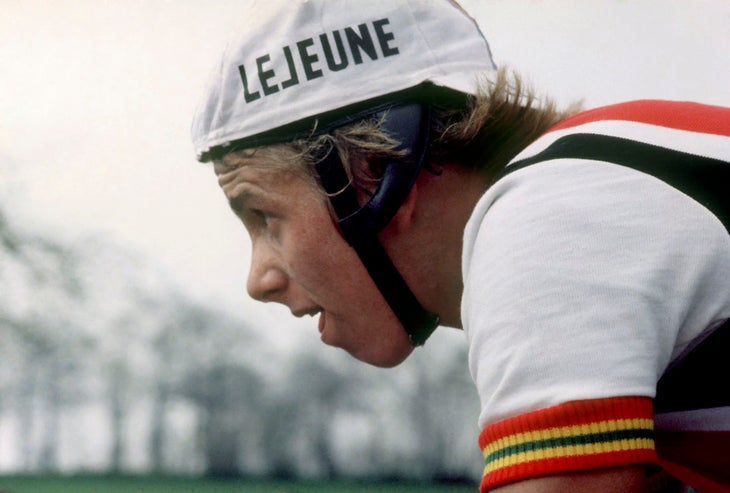
One of those, Sean Kelly, was tipped as a possible winner of the Utsunomiya worlds in Japan. Defending champion Greg LeMond was another favorite, psyched after his Tour de France victory. But as the big guns watched each other and dithered in their pursuit, Dhaenens and Belgian teammate Dirk de Wolf pushed forward from a small breakaway and crossed the line eight seconds clear of a star-studded chase group led home by Gianni Bugno (Italy).
Dhaenens’ moment of glory was the peak of his career; the following season, his results included fourth on a stage of the Tour de France and third on a stage of the Volta a Catalunya. He reverted to his domestique role and then, in 1992, two years after the biggest success of his career, heart problems forced an early retirement.
Six years later he died tragically, crashing his car en route to the finish of the Tour of Flanders where he was due to commentate on the race for Eurosport. It was just eight years after he stunned the world with his unexpected win.
-
- Rudy Dhaenens (Belgium): 06:51:59
- Dirk De Wolf (Belgium): S.T
- Gianni Bugno (Italy): +0:00:08
- Greg LeMond (USA): S.T
- Sean Kelly (Ireland): S.T
- Laurent Jalabert (France): S.T
- Johnny Weltz (Denmark): S.T
- Andreas Kappes (Germany): S.T
- Maurizio Fondriest (Italy): S.T
- Claude Criquielion (Belgium): S.T
1998: Oscar Camenzind
Heading into the 1998 worlds, two big topics were big on people’s minds. The first was the disastrous Festina Affair, which had decimated the Tour de France months earlier and brought the sport to the brink of downfall. The second was the return of Lance Armstrong after his battle with testicular cancer. The Texan had stunned cycling analysists with his fourth place in the Vuelta a España and that form, plus his previous world championship win in 1993, had many speculating that he could land his second rainbow jersey.
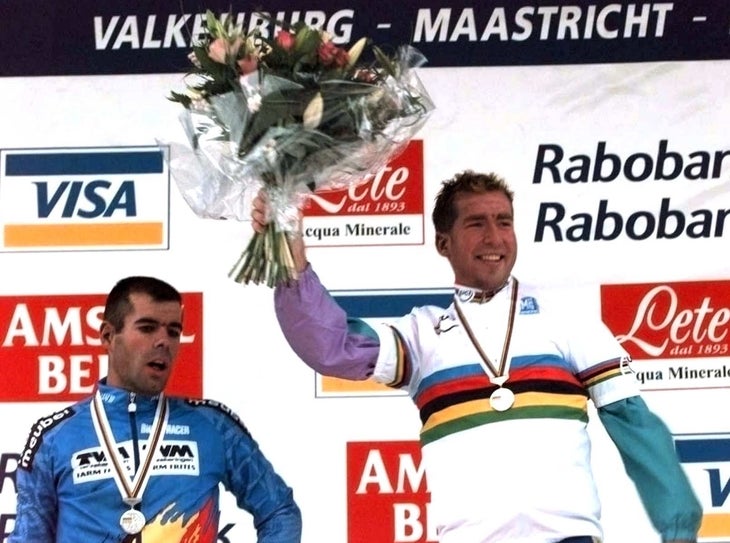
However on a cold, wet and muddy day in Valkenburg, another competitor proved stronger. Six riders led heading onto the final lap, namely Armstrong, Oscar Camenzind (Switzerland), Michael Boogerd (Netherlands), Michele Bartoli (Italy), Peter Van Petegem (Belgium) and Niki Aebersold (Switzerland).
Camenzind had finished second in the previous year’s Tour de Suisse and had also been fourth in the 1998 Giro d’Italia. However others in the lead group had far better career results, and so it was a big surprise when he soloed clear on the final lap. Boogerd punctured, losing his chance, while Armstrong and Aebersold were suffering in the difficult weather conditions and were dropped.
Van Petegem and Bartoli tried to reel in the Swiss rider but trailed in 23 seconds back. Armstrong led in the other two riders one minute and ten seconds behind.
Camenzind confirmed his new level by taking the Giro di Lombardia six days later, and won the Tour de Suisse in 2000 and Liège-Bastogne-Liège the following year. However in 2004 he tested positive for EPO prior to the Athens Olympics. He retired from the sport and admitted using the banned substance, but refused court orders to name his supplier. He said that he could be put in danger if he did so, and also claimed that he could be arrested in another country if he spoke out.
- Oscar Camenzind (Switzerland): 06:01:28
- Peter Van Petegem (Belgium): +00:00:23
- Michele Bartoli (Italy): S.T
- Lance Armstrong (USA): +00:01:10
- Niki Aebersold (Switzerland): S.T
- Micheal Boogerd (Netherlands): S.T
- Marc Wauters (Belgium): +00:04:31
- Andrea Tafi (Italy): +00:04:44
- Raimondas Rumsas (Lithuania): S.T
- Udo Bolts (Germany): S.T
1999: Oscar Freire
Verona was the location for the 1999 worlds and many expected the setting for Romeo and Juliet to be a fairytale for Frank Vandenbroucke. The Belgian was dually regarded as a hugely talented bike rider but also a troubled individual; his career was marked by peaks and troughs, but he appeared to be on top of his game when he won the 1999 Het Volk and Liège-Bastogne-Liège, then took two stages plus the points classification in the Vuelta a España.
Vandenbroucke was so confident that he would become world champion that he predicted his success in a conversation with Belgian great Eddy Merckx beforehand. However things didn’t go to plan: he crashed during the race, fracturing both wrists. He continued on but his injury meant that he couldn’t ride explosively out of the saddle. Instead, nine riders headed into the final kilometer, with the practically-unknown Oscar Freire putting in a text-book perfect surge with about 500 meters to go.
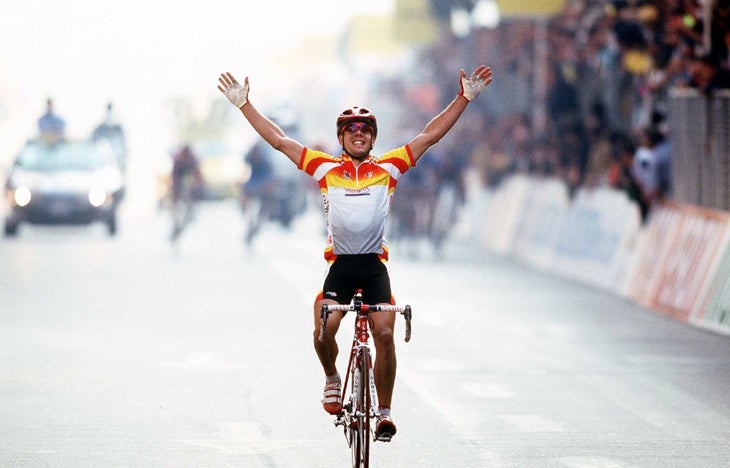
The Spaniard’s move was incredibly timed: the group snaked to the right on the wide finishing straight, then quickly snapped back towards the left. Rather than following that train, Freire leaped from his position of third-last rider just as the others were heading towards the left barrier and, using the right-hand side of the road, caught them completely unawares.
The others hesitated and that was all Freire needed: he crossed the line four seconds ahead of Marcus Zberg (Switzerland) and Jean-Cyril Robin (France). Vandenbroucke and Jan Ullrich were amongst the others trailing in as part of the same group.
At the time, 23-year-old Freire was regarded by some as a lucky winner but he quickly set about proving the doubters wrong. He won two stages of the Vuelta a España the following season, as well as a clutch of other victories, then won the worlds again in 2001 and 2004. Those three victories saw him draw level with the previous record shared by Alfredo Binda, Rik van Steenbergen, and Eddy Merckx.
He was a superb sprinter, a solid climber and a brilliant race tactician. His palmares also includes three editions of Milan-San Remo, three of Brabantse Pijl, one each of Gent-Wevelgem and Paris-Tours, four Tour de France stage wins plus the 2008 points classification, seven Vuelta a España stages and the 2005 Tirreno-Adriatico.
Of the unexpected worlds winners we have listed here, he was by far the most successful afterward.
- Oscar Freire Gomez (Spa): 06:19:29
- Marcus Zberg (Switzerland): +00:00:04
- Jean-Cyril Robin (France): S.T
- Francesco Casagrande (Italy): S.T
- William Chann McRae (USA): S.T
- Oscar Camenzind (Switzerland): S.T
- Frank Vandenbroucke (Belgium): S.T
- Jan Ullrich (Germany): S.T
- Dmitri Konyshev (Russia): S.T
- Daniele Nardello (Italy): 00:00:59 secs
2000: Romāns Vainšteins
Following the surprises in 1998 and 1999, a hat-trick of unexpected winners was completed the following season when Romāns Vainšteins blasted home first. The Latvian was a decent rider, having won Paris-Brussels, a stage in the Giro d’Italia and two in Tirreno-Adriatico the previous year, but nobody expected that he could be best of the bunch in Plouay, France.
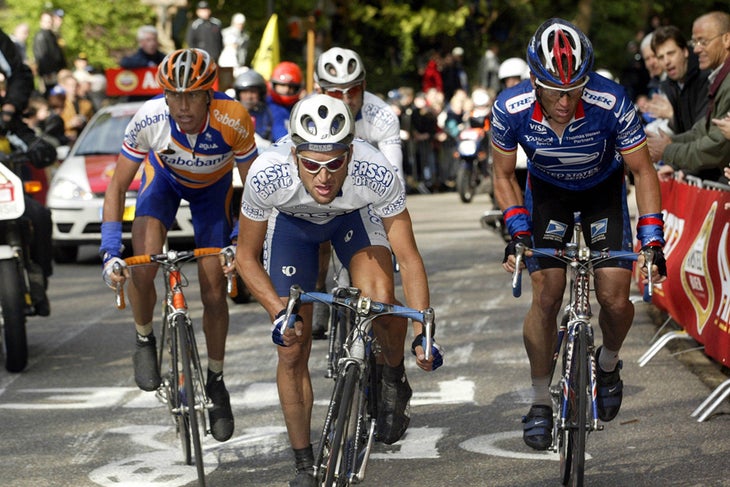
The race featured a very strong Andre Tchmil (Belgium), who tussled repeatedly with the Italian team of Michele Bartoli. They canceled each other out and heading towards the line, Bartoli’s teammate Francesco Casagrande put in an impressive yet ultimately futile solo move. Tchmil tried again but the Italians brought him back once again.
Defending champion Freire was in fine form and appeared poised to repeat his win. However he got boxed in close to the line and while he was able to extricate himself a couple of seconds later, the delay was enough for Vainšteins and Zbigniew Spruch (Poland) to hit the line ahead.
The new world champion logged some solid results the following season, including stages in Tirreno-Adriatico and the Volta a Catalunya plus third in Milan-San Remo and Paris-Roubaix. However that was as good as it got for him; he raced for three more seasons but never approached anything like the same heights again.
- Romāns Vainšteins (Latvia) +06:15:28 (42.698 km/h)
- Zbigniew Spruch (Poland): S.T
- Oscar Freire Gomez (Spain): S.T
- Michele Bartoli (Italy): S.T
- Tobias Steinhauser (Germany): S.T
- Niki Aebersold (Switzerland): S.T
- Scott Sunderland (Australia): S.T
- William Chann Mcrae (USA): S.T
- Paolo Bettini (Italy): S.T
- Francesco Casagrande (Italy): S.T
2003: Igor Astarloa
Having won three World Cup races during the 2003 season, Paolo Bettini was tipped as probably the biggest favorite for the 2003 worlds in Hamilton, Canada. The Italian went into the race a year after compatriot Mario Cipollini triumphed and while the course was too tough for the sprinter to repeat – in fact, he didn’t even take part – Bettini’s strong season and his ability to handle punchy climbs put him high on his rivals’ danger list.
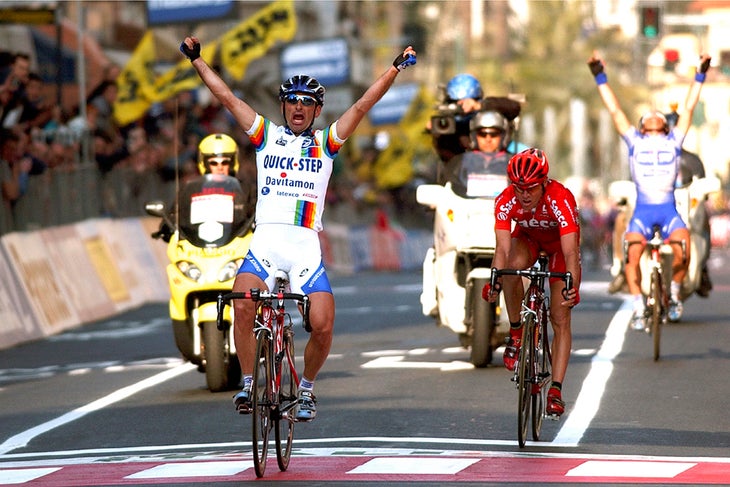
Also tipped were Oscar Freire (Spain) and Peter Van Petegem (Belgium). But at the end of a hard, hilly race, the little-known Igor Astarloa slipped away with Van Petegem, Bettini, Michael Boogerd (Netherlands), Oscar Camenzind (Switzerland), and Bo Hamburger (Denmark), then rocketed clear on a long drag with approximately three kilometers remaining. He cleaved through a strong headwind to reach the line five seconds ahead of Alejandro Valverde (Spain), Van Petegem, and Bettini.
Although the Spaniard had won that year’s Flèche Wallonne, his trouncing of far bigger names surprised many. He never showed the same dominant form again: the following year, his sole victory of note was a stage of the Brixia Tour. In 2005 he took a stage of the Vuelta a Burgos, and in 2006 he won Milan-Turin. His career stuttered after that, with his Milram team ending its contract with him in May 2008 amid reports of irregular blood values.
Although Astarloa raced on with the smaller Amica Chips-Knauf team, he was named in June 2009 as one of the five riders who were red-flagged by the UCI’s new biological passport scheme. He retired several months later and was subsequently handed a two-year suspension plus a fine of €35,000. Media reports suggested that blood values in the time after his world championship win were amongst those which had come to the UCI’s attention.
- Igor Astarloa (Spain): 06:30:19
- Alejandro Valverde Belmonte (Spain): +00:00:05
- Peter Van Petegem (Belgium): S.T
- Paolo Bettini (Italy): S.T
- Michael Boogerd (Netherlands): +00:00:06
- Bo Hamburger (Denmark): S.T
- Michael Barry (Canada): S.T
- Luca Paolini (Italy): 00:00.12
- Oscar Freire Gomez (Spain): S.T
- Janek Tombak (Estonia): S.T
As can be noted, there is a gap of over a decade between that last surprise winner and Pedersen. The next 15 editions after Astarloa’s triumph were far more predictable, with riders such as Freire, Tom Boonen, Paolo Bettini, Cadel Evans, Thor Hushovd, Mark Cavendish, Philippe Gilbert, Peter Sagan, and Alejandro Valverde all emerging on top.
Pedersen’s success this year heralded a return to the surprise champion. So, what happens next for the young Dane? That’s down to Pedersen – time will tell if his career shines brightly like Freire, or fizzles out like those of Dhaenens, Camenzind, Vāinšteins, and Astarloa.
